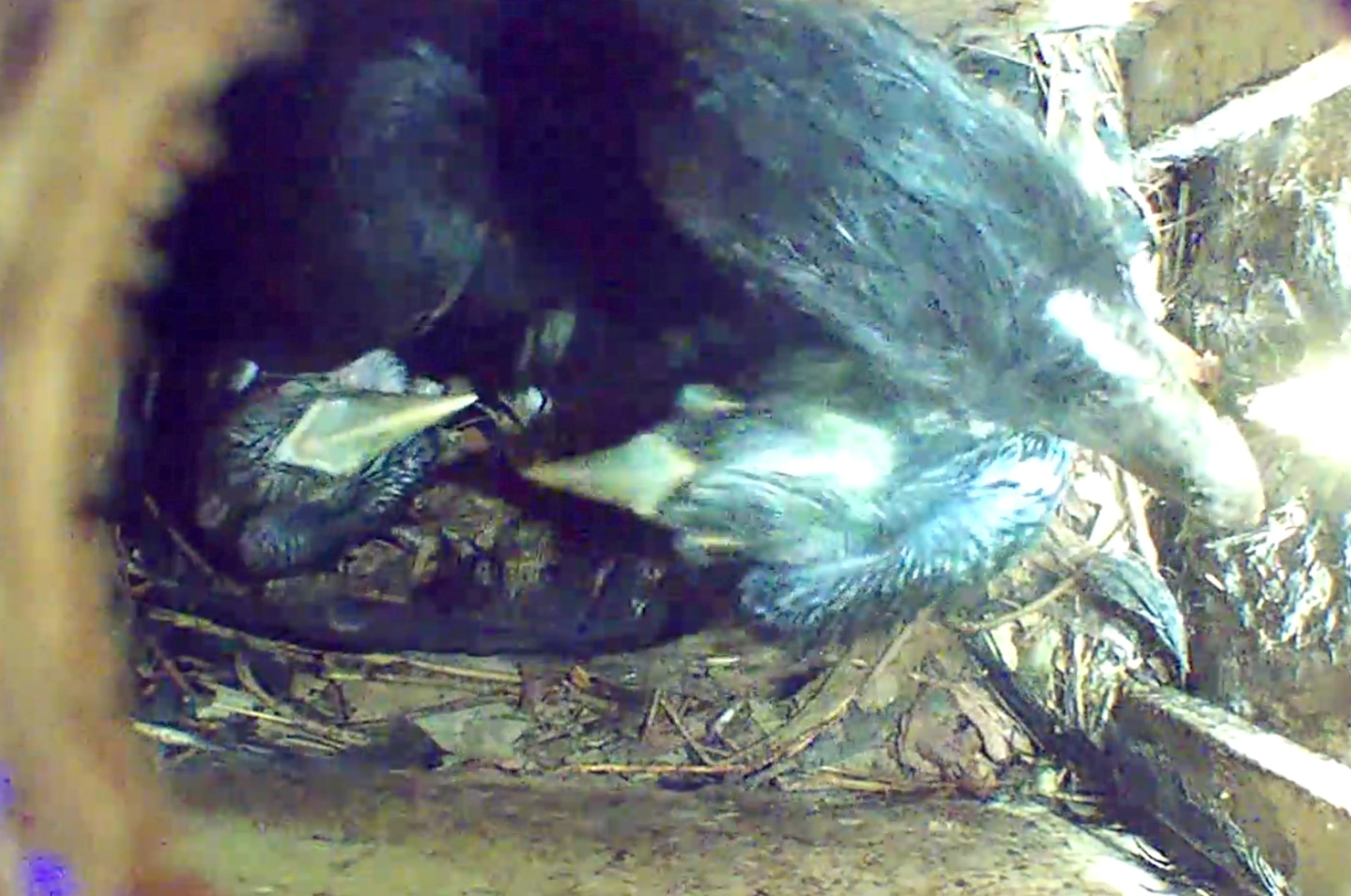Paradise Wildlife Park is proud to announce that their rare Black Hornbills have hatched a second pair of chicks, in what is thought of to be a world-first known documented event within the species.
Back in April, the breeding pair were announced to be the first pair in Europe to hatch and rear a healthy chick during a two-year period. The Hornbill pair have defied all previous known knowledge about the species, having successfully bred and hatched a pair of chicks for the second time in one year. Both chicks are currently healthy and growing alongside attentive mum Mulu inside the nest box. In the early hours on the 23rd June, Mulu the female black hornbill, once again sealed herself into the nest box, merely 12 days after exiting the nest box with her first chick Biru. It was on the 30th June keepers were alerted to eggs being laid on the CCTV cameras in the nest box and they continue to keep an eye on mum and babies.
Black Hornbill’s are a species of hornbill native to Asia and are found mainly in lowland forest habitats. According to the International Union for the Conservation of Nature (IUCN) Red List, the species is considered Vulnerable to the risk of extinction in the wild due to high levels of deforestation and hunting. These chicks mark a major discovery in the documentation of the species as well as in conservation breeding.
Currently only 26 Black Hornbills are registered in the EE (EAZA Ex-situ Programme) breeding program across all European Zoos. Although Mulu and Darwin are new to parenting, both are doing an amazing job. Darwin continues to act as a great partner providing Mulu with plenty of food. Both mum and the new chicks still rely on Darwin heavily, whilst he cares for young Biru, their previous chick, outside the nest.
Mulu with her chicks | Robert Everett
The bird team at Paradise have worked incredibly hard to create a favourable breeding environment. This includes nest box building, to using a misting system to replicate rainfall and a carefully managed diet. All of this has led to this incredible so far unknown breeding behaviour within the species, to be documented. If the chicks successfully make it past early stages towards fledging we expect to see them break out of the nest box with mum Mulu around late September to early October. These two chicks will add to the genetic diversity and population of this vital breeding program and create an insurance policy for Black Hornbills in the wild. With little research known about the species, this incredible event might be a newly documented occurrence in Black Hornbill behaviour.
Related Members
-
News
.png?w=100&h=100&zc=1&f=jpeg&hash=349b205c6ffbadb512c0c553a36012cd) Pride Blog: Queer Pioneers 13th June, 2025Maddie Humfryes, Visitor Programmes Officer at Whipsnade Zoo, on inspiring figures across natural history and science. As we celebrate Pride Month this…
Pride Blog: Queer Pioneers 13th June, 2025Maddie Humfryes, Visitor Programmes Officer at Whipsnade Zoo, on inspiring figures across natural history and science. As we celebrate Pride Month this… -
News
.png?w=100&h=100&zc=1&f=jpeg&hash=a334bc2d031fd7fad7c15bb92b580873) Baby Boom at Welsh Mountain Zoo 13th June, 2025There has been a wonderful Spring time baby boom at the Welsh Mountain Zoo, with the pitter patter of tiny feet and claws, to be heard across several…
Baby Boom at Welsh Mountain Zoo 13th June, 2025There has been a wonderful Spring time baby boom at the Welsh Mountain Zoo, with the pitter patter of tiny feet and claws, to be heard across several… -
News
.png?w=100&h=100&zc=1&f=jpeg&hash=63588c0ab498a20351e5a4bc62be4232) Baby Boom continues at Safari Park with announcement of Lion Cub Triplets… 13th June, 2025The cat’s out the bag at West Midlands Safari Park as keepers proudly announced the birth of three lion cubs. The adorable trio arrived on 13 April…
Baby Boom continues at Safari Park with announcement of Lion Cub Triplets… 13th June, 2025The cat’s out the bag at West Midlands Safari Park as keepers proudly announced the birth of three lion cubs. The adorable trio arrived on 13 April…



